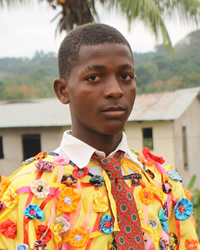The Principense people speak Principense Creole, locally known as Lunguye, a Portuguese-based creole language with Bantu and Kwa substrates. It developed in the 16th century after the Portuguese colonized the previously uninhabited islands of São Tomé and Príncipe. The population of Príncipe was formed by Portuguese settlers and African slaves, primarily from Nigeria and the Congo region.
Principense Creole is now critically endangered, spoken fluently by fewer than 200 elderly individuals, while most of the population uses Portuguese or Cape Verdean Creole. The language shares many features with Forro, another creole spoken on São Tomé, and may be considered a dialect of it.
The Principense people live primarily on the island of Príncipe. The island is volcanic and forested, with most residents living in the northeast near the capital, Portinho.
Historically, the economy was based on coffee and cocoa plantations, worked by enslaved Africans. Today, much of the agriculture is small-scale and the economy remains limited and fragile.
Family structures are often polygynous, with many households headed by women. The community celebrates a syncretic Creole culture, blending Portuguese Roman Catholic traditions with African heritage. Infrastructure is sparse outside urban areas, and many rural regions lack access to basic services.
The Principense people are almost entirely Christian. Roman Catholicism is the dominant tradition, inherited from Portuguese colonial influence. However, folk beliefs and African spiritual practices are often blended with Christian rituals, creating a syncretic religious landscape.
Religious life is centered around church attendance, festivals, and family-based spiritual practices. Despite the high percentage of Christian affiliation, there is a need for deeper discipleship and biblical literacy.
They need improved infrastructure, such as access to clean water, healthcare, and education in rural areas.
They need spiritual renewal, especially where Christianity is mixed with folk beliefs and lacks biblical grounding. They need culturally sensitive discipleship, with Christian materials and leaders who understand their linguistic and cultural context. They need access to Scripture, as there is currently no Bible translation, JESUS Film, or gospel recordings in Principense Creole.
Pray for revival and spiritual depth among Principense Christians, that they may grow in biblical understanding and faith.
Pray for local leaders and pastors to rise up and disciple others in culturally relevant ways.
Pray for the translation of Scripture and gospel media into Principense Creole.
Pray for improved infrastructure.
Scripture Prayers for the Principense in São Tomé and Príncipe.
Principense Creole – Wikipedia
APiCS Online – Survey Chapter: Principense
Principe – MillMint Cultural Overview
| Profile Source: Joshua Project |










